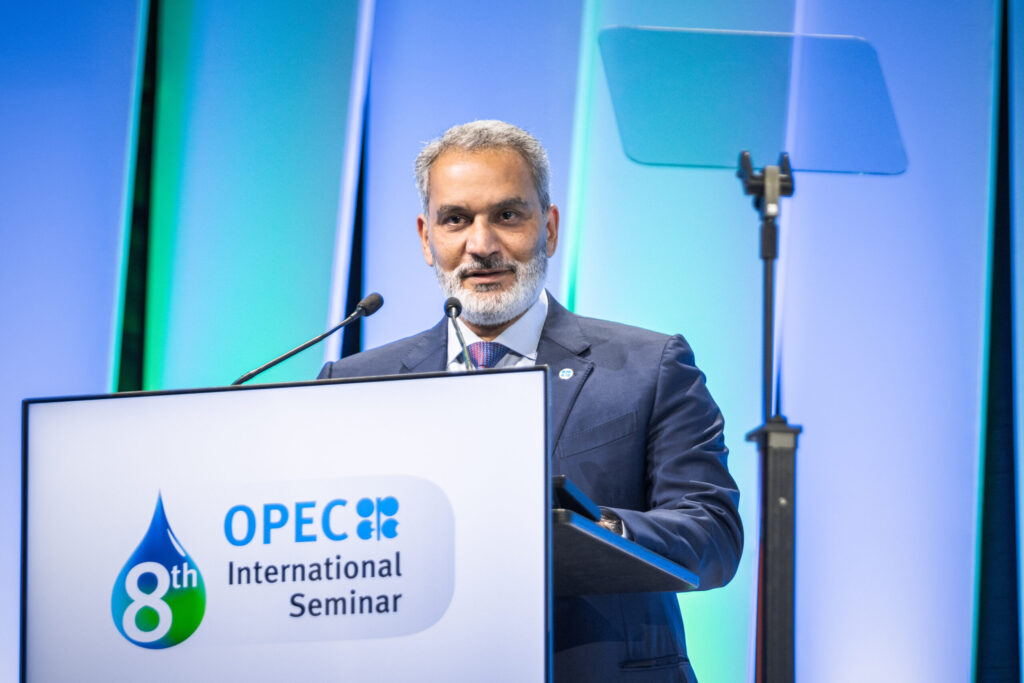The Organisation of the Petroleum Exporting Countries (OPEC) has issued a stark warning that the world could face a massive crude oil shortfall of up to 23 million barrels per day (bpd) by 2030 if investments in upstream oil production fail to meet projected needs.
The statement was made by OPEC Secretary-General Haitham Al Ghais at the 24th Nigeria Oil and Gas (NOG) Energy Week Conference and Exhibition held in Abuja.
Addressing global energy leaders and stakeholders, Al Ghais emphasized that long-term energy security hinges on sustained and comprehensive investment across the oil and gas value chain.
He highlighted OPEC’s latest World Oil Outlook, which estimates that a cumulative $17.4 trillion in oil-related investment is required by 2050 to meet rising global energy demand.
“If the world stops investing in upstream oil production today, we risk a shortfall of 23 million barrels per day by the end of this decade.
“This is not just a warning—it is a call to action for industry, governments, and financial institutions.”
OPEC Secretary-General Haitham Al Ghais

OPEC’s projections indicate that global primary energy demand is set to grow by 23% by 2050, driven primarily by a growing global population, accelerating urbanisation, and economic development in emerging markets.
The Secretary-General revealed that the world’s population is expected to increase from 8.2 billion in 2024 to 9.7 billion by 2050, with around 1.9 billion people migrating to cities during the same period.
This urban expansion will place enormous pressure on energy infrastructure, but Al Ghais also framed it as an opportunity to improve global access to energy.
“We must ensure that this growth does not come at the cost of energy equity.
“Today, 675 million people still lack access to electricity, and 2.3 billion do not have access to clean cooking fuels. These are not just numbers they are lives and livelihoods.”
OPEC Secretary-General Haitham Al Ghais
Oil’s Enduring Role in the Global Energy Mix

Despite the growing momentum behind renewable energy and global net-zero targets, OPEC maintains that oil will remain the leading source of global energy, comprising nearly 30% of the energy mix by 2050.
When combined, oil and natural gas are projected to supply over 50% of global energy needs by mid-century.
Al Ghais acknowledged the global energy transition but cautioned against underestimating the continued role of hydrocarbons in global economic development, especially in the Global South.
“Let’s be realistic, developing countries must be allowed to responsibly harness their natural resources to fuel growth.
“Hydrocarbons will remain a cornerstone of development and energy security, particularly in Africa, Asia, and Latin America.”
OPEC Secretary-General Haitham Al Ghais

Al Ghais reiterated the importance of a balanced approach to energy transition, advocating for inclusive policies that promote innovation, technology transfer, and investment in clean energy solutions within the oil and gas sector.
“We’re already seeing innovation across the industry, from carbon capture and storage (CCS) to methane abatement and digital optimisation.
“Cleaner, more efficient technologies are here and must be deployed at scale.”
OPEC Secretary-General Haitham Al Ghais
He also appealed to governments and financial institutions to avoid restrictive policies that discourage investment in hydrocarbons, noting that such actions could jeopardize energy access and economic resilience in resource-dependent nations.
OPEC’s bold projections and call to action come at a time when the global energy sector faces growing geopolitical tensions, shifting climate policies, and pressure to meet net-zero targets.
Yet, as Al Ghais made clear, the world cannot afford to neglect conventional energy investments while striving for a greener future.
READ ALSO: Mastercard and Access Bank Unveil Innovative Age-Segmented Card to Empower Ghana’s Youth



















